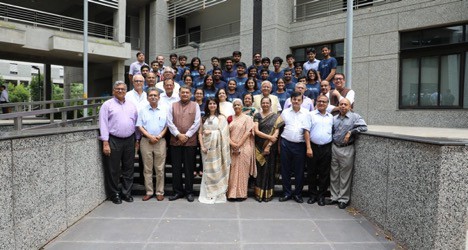INVENT@IITGN, Gandhinagar for IITians: Design, Create, Innovate, Patent and Inspire

“Invention is the root of innovation. Innovation is the major force for change in the future.” – Philippe Kahn, renowned mathematician, technology innovator, entrepreneur and founder of four technology companies.
Development plays a crucial role in the survival and success – of an individual and ultimately a country (if we look at the bigger picture) – and innovation forms the backbone of this development process. Working along the same lines, numerous programmes have been launched by the Government of India over the past few years to promote inventions. The ultimate objective is to create countless opportunities, protect intellectual property and establish our country as a global manufacturing giant by means of swadeshi initiatives like ‘MAKE IN INDIA’.
IIT Gandhinagar is a strong promoter of the concept of learning-by-doing in its students. The Institute believes in inculcating a type of learning that intends to create scientific temper and nurture inherent creativity in students, encouraging them to invent indigenous solutions for day-to-day technical problems and significant needs of our society (in the form of new models and technologies). As a significant step in this direction, INVENT@IITGN was started last year.
The first-of-its-kind in India, INVENT@IITGN is a unique six-week annual summer programme in which IITians throughout the country get the opportunity to conceptualise, build and test prototypes of their inventions at IIT Gandhinagar. The major criterion involves these inventions to cater to a real societal need and be practical in terms of feasibility, safety, size, weight and cost.
The participating students are mentored by The Cooper Union Professors – Alan Wolf and Eric Lima – alongside IITGN professors Vineet Vashista, Madhu Vadali and Nithin George, on how to develop their ideas into reality. The programme commences with a mandatory session on basic prototyping skills such as 3D printing, laser cutting and using simple tools. A budget of up to Rs. 50,000 is given to each team of two students for raw materials. The participants present their ideas to different jury panels every week and utilise their suggestions to further improve the prototypes. They write and file provisional patent applications with the Indian and US Patent and Trademark office and participate in a competition towards the end of the programme, where a panel of distinguished designers, inventors, engineers and patent attorneys choose the best inventions. The participants also receive a stipend of Rs. 10,000 and a certificate of participation.
June 28 this year saw the conclusion ceremony of INVENT@IITGN 2.0 which had a total of 28 students in 14 teams from nine IITs across the country including IIT Bombay, IIT Dhanbad, IIT Dharwad, IIT Gandhinagar, IIT Goa, IIT Guwahati, IIT Kharagpur, IIT Madras and IIT Palakkad. Prabal Vashisht and Parul Sangwan (IIT Palakkad) won the ‘Best Invention’ prize with the prize money of Rs. 2 lakh for inventing an inexpensive household electricity-saving solar device based on clock mechanism. The ‘Second Best Invention’ title with the prize money of Rs. 1 lakh was given to R Nambilakshmi (IIT Bombay) and Prathmesh Deshmukh (IIT Kharagpur) for developing reusable, eco-friendly, leak-proof food packaging. The prize money of Rs. 50,000 was given to Samruddhi Pataskar and Kalash Nibjiya (IIT Kharagpur) for being the ‘Third Best Innovation’. Other innovations included a storage device to prevent spoilage of food-items without the use of refrigeration, an automatic device to monitor glucose level and ensure proper dose of insulin, patient transfer tool for the disabled as a wheelchair add-on, an automatic pill dispenser system for patients with mild dementia, a device to clean inexpensive reusable sanitary pads, a robot arm to feed people with disability, etc.
“INVENT 2019 was an outstanding journey. We decided to work on a non-technical product to solve the problem of food packaging and developed several prototypes before the final design which is completely leak-proof. We received tremendous support and facilities at every stage. It feels great to develop and patent a commercially viable product in just six weeks!” said R Nambilakshmi from IIT Bombay and Prathmesh Deshmukh from IIT Kharagpur after creating the second best invention of this year’s program.
Last year, students from IIT Kharagpur, IIT Madras, IIT Guwahati, IIT Jammu and IIT Gandhinagar participated in this programme and formed 10 teams. They built various prototypes covering a wide diversity of areas which ranged from a solution to intra- and inter-row weeding for small-sized farms, navigation system for visually impaired and compact foldable toilets to paper bag making machine, a car under-run protection system that prevents a car from going under a heavy-duty vehicle during road accidents and load carrier for laborers.
Professor of Physics and US Patent Attorney Alan Wolf and Professor of Mechanical Engineering Eric Lima of The Cooper Union (a renowned engineering institute in New York) founded this program in the year 2013. In 2017, it was initiated as a summer programme at Syracuse University, where it was acknowledged by four distinguished US-based alumni of IIT Bombay. They decided to fund and start the programme at IITGN due to the Institute’s avant garde approaches, which aim to not just educate students but also inspire them to contribute towards the betterment of the society. Since its inception, this initiative has produced many exceptional inventions, a considerable number of which are moving towards commercial development.
The students that participated in this program in 2018 and 2019 found the idea of having the freedom to do everything needed to develop a useful invention and being able to file a patent in such a short duration to be extremely attractive. According to them, no other educational institute in India teaches how to conceptualize, create and develop innovations in such a small time-span:
“Innovation transforms the useful seeds of invention into widely adopted solutions valued above every existing alternative.” – Braden Kelley, Director of Innovation and Human-Centered Problem-Solving at Oracle and engaging innovation speaker.
